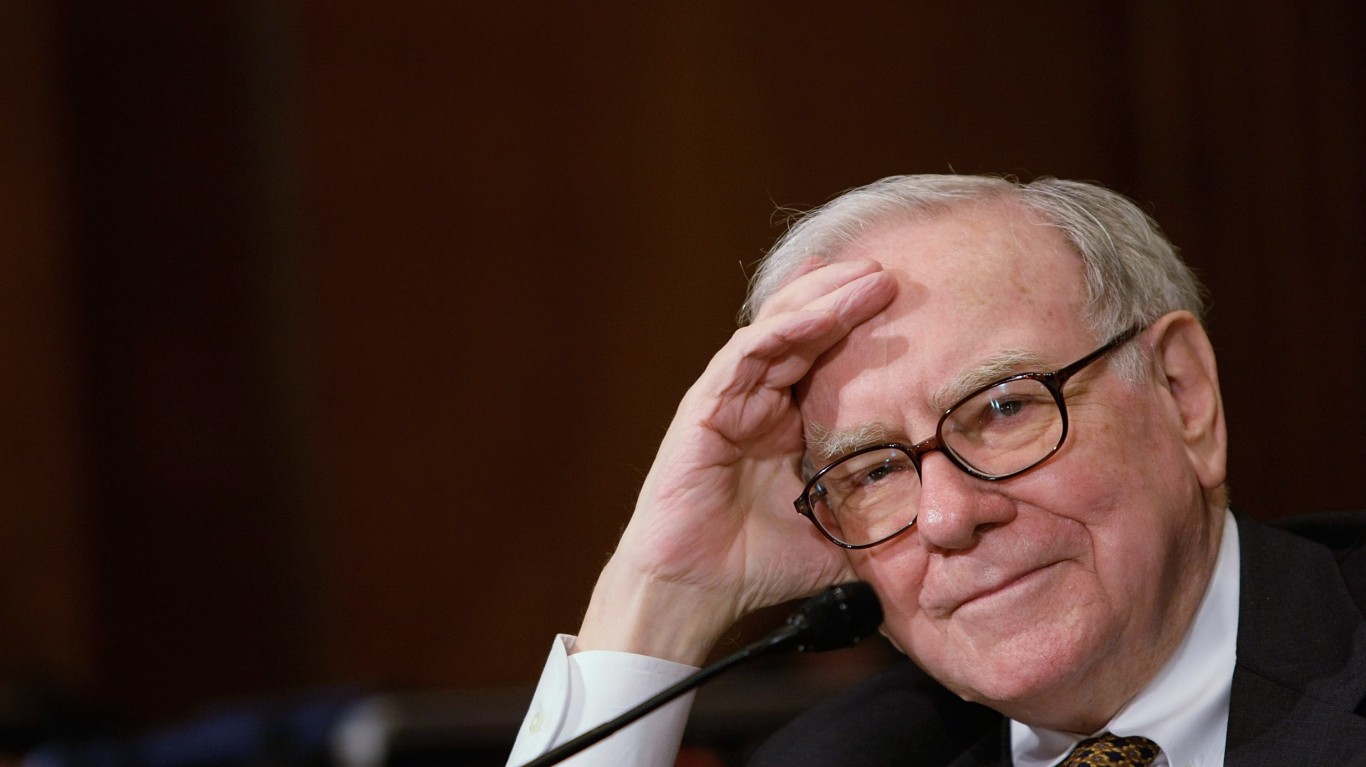Companies and Brands
10 Warren Buffett Quotes on Character Everyone Should Hear

Published:

Beyond his legendary investing prowess, Warren Buffett is revered for his unwavering focus on character and ethics. His wisdom is not contained in the stock market. He also offers profound insights into the human condition.
In this article, we’ll take a look at Buffett’s mind, reviewing some of his quotes about the importance of character. We’ll review everything from habits to virtues he considers essential.
But before we get started, here are some of his most profound insights.

Warren Buffett is a huge name in the investing world. We keep a close watch on his newest moves in the stock market and learn from his explanations. However, Buffett has a lot to say about things outside the stock market, too. Often, these quotes can help those who are learning how to invest or just be successful in life.

According to Warren Buffett, people don’t change just because they get money (or lose money). He once said: “Of the billionaires I have known, money just brings out the basic traits in them. If they were jerks before they had money, they are simply jerks with a billion dollars.”
Instead of changing someone’s character, money just amplifies it. With money, these people have more influence. Therefore, their traits only do more in the world. The foundation of someone’s character is already laid before financial success is achieved in most cases.

What all of this means is that wealth doesn’t equate to virtue. Material possessions cannot mask or transform a flawed personality. Those with questionable ethics or a lack of empathy will likely exhibit at least some of these qualities after they come into their wealth.
Buffett’s understanding underscores the importance of character development. It’s important to strive for personal growth and integrity, not just money.

Buffett famously said, “It takes 20 years to build a reputation and five minutes to ruin it. If you think about that, you’ll do things differently.” Your reputation is not necessarily your character. However, it does underscore the importance of character, as this is the cornerstone your reputation is built on.
A positive reputation is a product of consistent behavior over an extended period. If someone has integrity, reliability, and competence, they’re more likely to build a good reputation. However, one action can lead to irreparable damage to your reputation for decades.

Our actions have direct consequences far beyond just the immediate moment. Our reputation is how much business is done. Without it, we may be in pain later. It’s important to consider the long-term implications of our choices and to prioritize character over short-term gains.
Yes, sometimes it makes sense to focus on the short term. Other times, though, it’s a much better option to cultivate that strong moral foundation.

Warren Buffett cares far more about someone’s character than their money: “If you get to my age in life and nobody thinks well of you, I don’t care how big your bank account is, your life is a disaster.” True wealth is not just about your finances. It’s also about your character and the enduring impact.
Buffett suggests that a life well-lived is linked to how others perceive us. While material possessions may provide temporary gratification, they cannot compensate for a lack of character. You need to focus on building character and wealth.

It’s important to prioritize character over material possessions. Buffett encourages us to cultivate a strong character rather than just focusing on income. These attributes are the foundations of a fulfilling life that’s rich in relationships and meaningful connections. These are far more valuable than money.

Instead of focusing on the number in your bank account, it’s important to focus on other qualities, too. Warren Buffett suggests that true success is: “Basically, when you get to my age, you’ll really measure your success in life by how many of the people you want to have love you actually do love you.” It isn’t about money. It’s about relationships.
It’s important not to get too caught up in external validation. Our relationships become even more important as we age. In the end, they are the main determinants of our happiness and fulfillment, not how much money we make.
Our ability to maintain loving bonds is a testament to a life well-lived.

This perspective challenges the conventional notion of success. Many people consider success to be how much money you have in your bank account. However, this isn’t often true. Buffett proposes a more holistic view, emphasizing the importance of relationships over money. Often, emotional wealth is far more important than physical wealth.

Warren Buffett doesn’t believe that the rarest commodity is anything physical. Instead, he states: “Honesty is a very expensive gift. Don’t expect it from cheap people.” Honesty is a virtue that requires a high level of integrity, selflessness, and courage. These qualities are not easily cultivated. Therefore, honesty is in smart supply.
Those who are driven by material gain are less likely to prioritize honesty. It suggests that true honesty is a byproduct of a strong character. This can help you determine who has a strong character around you and give you something to aim for.

According to Buffett, it’s important to understand the value of honesty. You should discern your relationship with others based on honesty. When someone is dishonest, it shows something about their character. It also encourages us to show honesty in our relationships, though this often requires cultivating other qualities, too, like integrity.

Warren Buffett has been on Wall Street for a long time. One of his famous lines is a critique of the financial industry: “Wall Street is the only place that people ride to in a Rolls Royce to get advice from those who take the subway.” Buffett paints a vivid picture of the contract between affluent clientele and the experts who serve them.
This paradoxical quote says a lot about wisdom and wealth. Immense wealth is often held by those who lead seemingly modest lifestyles. True financial success is not correlated with material possessions in many cases. The “quiet rich” have expertise and knowledge but don’t always have outward signs of success.

Buffett’s observations serve as a reminder to question superficial indicators of success. You should seek wisdom from diverse sources, not just those with outward signs of wealth. The true value lies in substance and wisdom, not just money. Expertise is found in unexpected places.

Buffett isn’t a man who hoards his wealth. In fact, he places a high emphasis on giving back: “If you’re in the luckiest 1% of humanity, you owe it to the rest of humanity to think about the other 99%.” Social responsibility is important. It underscores the moral obligation of those who have benefited in their life.
Buffett’s assertion challenges the notion of unchecked individualism and promotes a sense of responsibility. Wealth comes with inherent duties to society, and Buffett highly recommends people give back to those who are less fortunate than they are.

Warren Buffett has given billions back, and he serves as a great example for anyone else coming into their wealth. Of course, giving back also comes with a certain amount of character. It takes selflessness to give back, after all.

Warren Buffett is a huge proponent of choosing quality “heroes,” which most people would call role models. He once said: “Tell me who your heroes are and I’ll tell you who you’ll turn out to be.” He’s mentioned heroes in several other instances, too, which just highlights how important he thinks they are.
If you want to be a virtuous person, you need virtuous people to model yourself after. The individuals we admire become our mentors, inspiring us to emulate their qualities. If you choose the wrong people, you’re in for some serious challenges. You need to choose people you respect and study how they succeeded.

In the end, Buffett compares choosing our heroes to choosing our destiny. Who we decide to copy is who we will become. It’s important to choose these people correctly, as they have a huge impact on our future.

Warren Buffett understood the importance of habit before most: “Chains of habit are too light to be felt until they are too heavy to be broken.” Everyone builds habits. Small, seemingly insignificant actions gradually accumulate into powerful forces that shape our lives. It’s important to control these small habits, then.
Habits are forged through repetition. Luckily, this gives us some time to correct it. Sadly, these patterns are often very subtle at first. We may hardly notice the impact. However, that’s exactly when habits become dangerous. We don’t notice them until they become entrenched, which is when they’re much harder to get rid of!

Habits can be good, of course, but Buffett is more worried about bad habits. Poor habits can limit our potential and chain us to the past. They can prevent us from achieving our goals. It’s important to be mindful of our daily routines and practices. Choose which habits you create so that you can align your habits with your goals.
By recognizing the power of habit, we can become a little bit freer from their influence.

Warren Buffett has talked a lot about habits and having the right mindset. However, one of his favorite habits is thinking: “I insist on a lot of time being spent, almost every day, to just sit and think. That is very uncommon in American business. I read and think. So I do more reading and thinking, and make less impulse decisions than most people in business.”
Buffett spends a lot of time contemplating. The world is characterized by moving fast and instant gratification. However, Buffett recommends taking a more deliberate approach. He emphasizes the importance of just sitting quietly and thinking.
He also prioritizes reading, which gives him time to think too. This allows him to develop a deep understanding of complicated problems, which is what allows him to make good decisions when he needs to.

Buffett challenges the common misconception that busyness equates to productivity. Instead, it is also important to pause and reflect daily. Don’t spend your time just being busy. By cultivating a habit of deliberate thought, individuals can enhance their decision-making abilities. It may not look productive to everyone else, but it’s important.
In our fast-paced world, it’s vital to slow down. It can even be a competitive advantage.
After two decades of reviewing financial products I haven’t seen anything like this. Credit card companies are at war, handing out free rewards and benefits to win the best customers.
A good cash back card can be worth thousands of dollars a year in free money, not to mention other perks like travel, insurance, and access to fancy lounges.
Our top pick today pays up to 5% cash back, a $200 bonus on top, and $0 annual fee. Click here to apply before they stop offering rewards this generous.
Flywheel Publishing has partnered with CardRatings for our coverage of credit card products. Flywheel Publishing and CardRatings may receive a commission from card issuers.
Thank you for reading! Have some feedback for us?
Contact the 24/7 Wall St. editorial team.